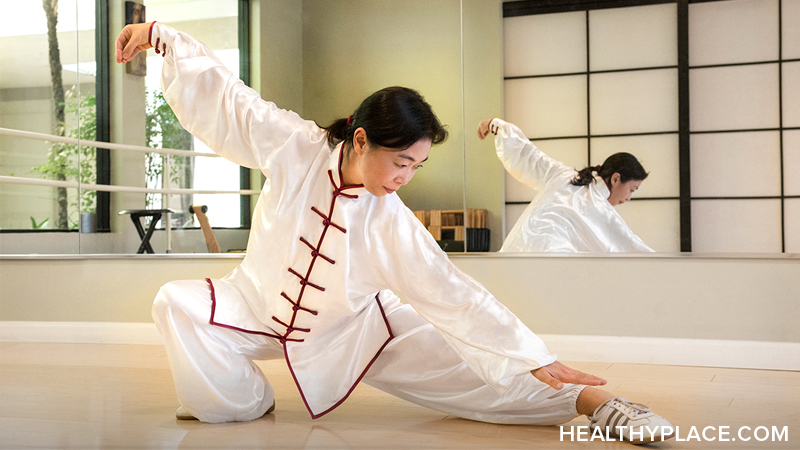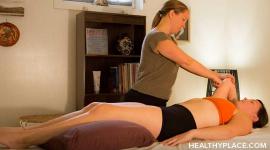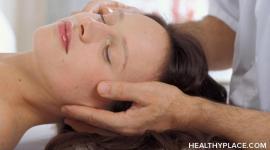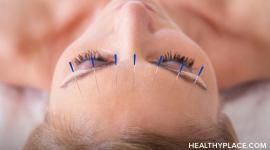Qi Gong for Psychological Disorders

Learn about Qi Gong. Qi Gong may be helpful in treating anxiety, depression, addiction, and other mental illnesses.
Before engaging in any complementary medical technique, you should be aware that many of these techniques have not been evaluated in scientific studies. Often, only limited information is available about their safety and effectiveness. Each state and each discipline has its own rules about whether practitioners are required to be professionally licensed. If you plan to visit a practitioner, it is recommended that you choose one who is licensed by a recognized national organization and who abides by the organization's standards. It is always best to speak with your primary health care provider before starting any new therapeutic technique.
Background
Qi Gong is a traditional Chinese medicine technique that is believed to be at least 4,000 years old. There are two types of Qi Gong: internal and external. Internal Qi Gong techniques include learned and self-directed exercises that involve sounds, movements and meditation. External Qi Gong (Qi emission) is practiced by a Qi Gongmaster who uses his or her hands with the aim to project qi (pronounced "chi") to others for the purpose of healing. More than 5,000 styles of Qi Gong have been cataloged by the Chinese government.
In traditional Chinese medicine, Qi Gong is considered beneficial for a large variety of medical conditions. Many practitioners believe there is a role for Qi Gong in treating chronic conditions such as cancer, chronic fatigue syndrome, osteoporosis, high blood pressure, stomach ulcers and asthma. Scientific evidence suggests a possible role for internal Qi Gong in the treatment of high blood pressure; this therapy may be beneficial when used with other treatments (such as prescription drugs). There is preliminary evidence that Qi Gong may manage pain and anxiety associated with pain. Internal Qi Gong actively engages a patient in his or her own health care and can be performed in the presence or absence of a Qi Gong master.
Theory
Qi Gong is sometimes described as "a way of working with life energy." There are three main branches of Qi Gong: medical (used for healing), spiritual (for self-awareness) and martial art (for self-protection). Qi Gong is generally intended to be harmonious with the natural rhythms of time and season. It may be practiced daily with the aim of health maintenance and disease prevention. Medical Qi Gong can be an active (internal) or passive (external) noninvasive technique that involves five steps: meditating, cleansing, strengthening/recharging, circulating and dispersing qi. Specific movements, meditations and sounds are used for each step.
Evidence
Scientists have studied Qi Gong for the following health problems:
High blood pressure
There is good evidence from several studies in humans suggesting that Qi Gong, when used with conventional treatments, may be of benefit for high blood pressure. Initial research reports fewer deaths among people with high blood pressure who practice Qi Gong. There is some evidence that internal Qi Gong relaxation exercises may be safe for helping to control high blood pressure associated with pregnancy. Further research is warranted.
Chronic pain
There is early research supporting the use of internal Qi Gong exercises or externally applied Qi for pain management and reduction of anxiety associated with pain. More evidence is needed before a firm recommendation can be made.
Heroin detoxification
A recent study looked at the effectiveness of Qi Gong therapy vs. medical and nonmedical treatment in the detoxification of heroin addicts. Results showed that qigong may be beneficial in heroin detoxification without side effects, although the possibility of the placebo effect cannot be completely eliminated. Other treatments have been better studied for heroin detoxification and are recommended at this time. Qi Gong may be used as an adjunct therapy.
Depression
Qi Gong has been studied in a small study of elderly patients to see if it helped depression in those with chronic physical illnesses. Study results were inconclusive, and further research is needed before a recommendation can be made. Qi Gong may be used as an adjunct to more proven therapies.
Cardiac rehabilitation
Cardiac rehabilitation programs are designed to improve heart health through activities such as monitored exercise, and they are often recommended for individuals who have heart failure or who have had a heart attack. One study suggests that Qi Gong may aid in cardiac rehabilitation in terms of improving physical activity, balance, and coordination. Further research is needed to confirm these findings.
Unproven Uses
Qi Gong has been suggested for many other uses, based on tradition or on scientific theories. However, these uses have not been thoroughly studied in humans, and there is limited scientific evidence about safety or effectiveness. Some of these suggested uses are for conditions that are potentially life-threatening. Consult with a health care provider before using Qi Gong for any use.
| Addiction Angina Anti-aging Anticoagulation Anxiety Asthma Atherosclerosis Attention-deficit hyperactivity disorder Back pain Cancer prevention and treatment Cardioprotection Congestive heart failure Diabetes Disability from chronic illness Fibromyalgia Gastritis Gastrointestinal disease Headache Health and wellness Heart attack prevention Heart disease | Heart rate variability Immune system stimulation Improved breathing Improved sleep Improved workplace efficiency Kidney disease Liver disease Low back pain Mania Mental illnesses Multiple sclerosis Neurologic disorders Orofacial pain Parkinson's disease Peripheral vascular disease Psychosis Respiration Stress reduction Stroke prevention Suicide prevention |
Potential Dangers
Qi Gong is generally believed to be to be safe in most people when practiced according to standard moderate principles and when learned under the guidance of a qualified teacher. Unguided exercises may worsen symptoms in some patients with psychiatric disorders. There is one report of an allergic skin reaction in Qi Gong trainees, although the exact cause is not clear. Qi Gong should not be used as the sole treatment for severe illnesses in place of more proven therapies. Use of Qi Gong should not delay consultation with a qualified health care provider for such conditions.
Summary
Qi Gong has been suggested for many conditions. Qi Gong may play a role in the management of chronic pain and high blood pressure as an addition to more proven standard treatments (such as prescription drugs). Qi Gong is generally believed to be safe when practiced appropriately, but it should not be used as the sole treatment for severe illnesses, and people with psychiatric disorders should only practice Qi Gong under supervision. Speak with a qualified health care provider if you are considering Qi Gong.
The information in this monograph was prepared by the professional staff at Natural Standard, based on thorough systematic review of scientific evidence. The material was reviewed by the Faculty of the Harvard Medical School with final editing approved by Natural Standard.
Resources
- Natural Standard: An organization that produces scientifically based reviews of complementary and alternative medicine (CAM) topics
- National Center for Complementary and Alternative Medicine (NCCAM): A division of the U.S. Department of Health & Human Services dedicated to research
Selected Scientific Studies: Qi Gong
Natural Standard reviewed more than 380 articles to prepare the professional monograph from which this version was created.
Some of the more recent studies are listed below:
- Agishi T. Effects of the external qigong on symptoms of arteriosclerotic obstruction in the lower extremities evaluated by modern medical technology. Artif Organs 1998;22(8):707-710.
- Chen KW, Marbach JJ. External qigong therapy for chronic orofacial pain. J Altern Complement Med 2002;Oct, 8(5):532-534.
- No abstract available. Creamer P, Singh BB, Hochberg MC, et al. Sustained improvement produced by nonpharmacologic intervention in fibromyalgia: results of a pilot study. Arthritis Care Res 2000;13(4):198-204.
- Ismail K, Tsang HW. Qigong and suicide prevention. Br J Psychiatry 2003;Mar, 182:266-267.
- No abstract available. Iwao M, Kajiyama S, Mori H, et al. Effects of qigong walking on diabetic patients: a pilot study. J Altern Complement Med 1999;5(4):353-358.
- Kemp CA. Qigong as a therapeutic intervention with older adults. J Holist Nurs 2004;22(4):351-373.
- Kerr C. Translating "mind-in-body": two models of patient experience underlying a randomized controlled trial of qigong. Cult Med Psychiatry 2002;Dec, 26(4):419-447.
- Lee MS, Huh HJ, Jeong SM, et al. Effects of Qigong on immune cells. Am J Chin Med 2003;31(2):327-335.
- Lee MS, Huh HJ, Kim BG, et al. Effects of Qi-training on heart rate variability. Am J Chin Med 2002;30(4):463-470.
- Lee MS, Jeong SM, Kim YK, et al. Qi-training enhances respiratory burst function and adhesive capacity of neutrophils in young adults: a preliminary study. Am J Chin Med 2003;31(1):141-148.
- Li M, Chen K, Mo Z. Use of qigong therapy in the detoxification of heroin addicts. Altern Ther Health Med 2002;Jan-Feb, 8(1):50-54, 56-59.
- Lim YA, Boone T, Flarity JR, et al. Effects of qigong on cardiorespiratory changes: a preliminary study. Am J Chin Med 1993;21(1):1-6.
- Loh SH. Qigong therapy in the treatment of metastatic colon cancer. Altern Ther Health Med 1999;5(4):111-112.
- Mayer M. Qigong and hypertension: a critique of research. J Altern Complement Med 1999;5(4):371-382.
- Reuther I, Aldridge D. Qigong Yangsheng as a complementary therapy in the management of asthma: a single-case appraisal. J Altern Complement Med 1998;4(2):173-183.
- Stenlund T, Lindstrom B, Granlund M, et al. Cardiac rehabilitation for the elderly: Qi Gong and group discussions. Eur J Cardiovasc Prev Rehabil 2005;12(1):5-11.
- Suzuki M, et al. Clinical effectiveness of the AST Chiro method on the chronic renal failure and angina pectoris. Jap Mind-Body Science 1993;2(1):61-70.
- Tsang HW, Cheung L, Lak DC. Qigong as a psychosocial intervention for depressed elderly with chronic physical illnesses. Int J Geriatr Psychiatry 2002;Dec, 17(12):1146-1154.
- Tsang HW, Mok CK, Au Yeung YT, Chan SY. The effect of Qigong on general and psychosocial health of elderly with chronic physical illnesses: a randomized clinical trial. Int J Geriatr Psychiatry 2003;May, 18(5):441-449.
- Wang C, Xu D, Qian Y, et al. Effects of qigong on preventing stroke and relaxing the multiple cerebro-cardiovascular risk factors: follow up of 242 hypertensive patients for 30 years. Proc Second World Conf Academ Exch Med Qigong 1993;123-124.
- Wu CY. An inquiry into the etiology of Qigong induced mental disorders and a follow-up study of fifty-three cases. J Clin Psych Med 1993;3:132-133.
- Wu R, Liu Z. Study of qigong on hypertension and reduction of hypotensor. Proc Second World Conf Academ Exch Med Qigong 1993;125.
- Wu WH, Bandilla E, Ciccone DS, et al. Effects of qigong on late-stage complex regional pain syndrome. Altern Ther Health Med 1999;5(1):45-54.
- Yu X, Xu J, Shao D, et al. The auxiliary qigong therapy for Parkinson's disease and its effects on EEG and P300. J Intl Soc Life Info Science 1998;16(1):73-81.
- Yang ZC, Yang SH, Yang SS, Chen DS. A hospital-based study on the use of alternative medicine in patients with chronic liver and gastrointestinal diseases. Am J Chin Med 2002;30(4):637-643.
- Zauner-Dungl A. [Is Qi Gong suitable for the prevention of low back pain?]. Wien Med Wochenschr 2004;154(23-24):564-567.
- Zhang SX, Guo HZ, Zhu J, et al. Qigong and L-1 straining maneuver oxygen system requirements with and without positive pressure breathing. Aviat Space Environ Med 1994;65(11):986-991.
back to: Alternative Medicine Home ~ Alternative Medicine Treatments
APA Reference
Staff, H.
(2008, December 24). Qi Gong for Psychological Disorders, HealthyPlace. Retrieved
on 2026, February 24 from https://www.healthyplace.com/alternative-mental-health/treatments/qi-gong-for-psychological-disorders



